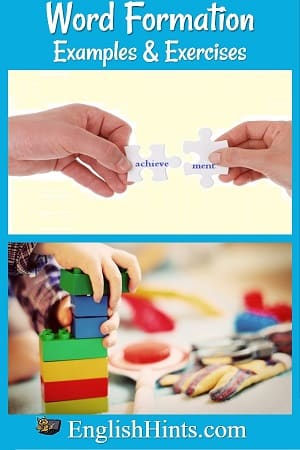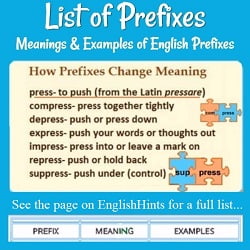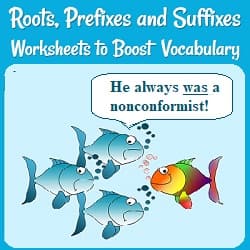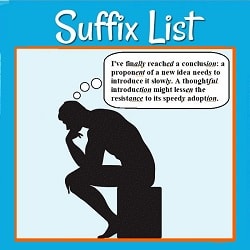Word Formation Examples & Exercises
These word formation examples show how English words change form. They demonstrate the use of many of the word endings in the List of Suffixes with examples from different word families.
Study the various related words in each family. Then check your understanding of how to use those words with a gap-fill exercise.
Detailed Word Formation Examples
To emphasize means to call attention to something or show that it is important. We can put emphasis on an idea by stressing its value or by explaining it thoroughly.
Speaking emphatically is stating something in a definite (and often loud) way. It leaves no room for uncertainty.
To employ usually means to give a job to someone—to pay them for their work.
The nouns are employment (or unemployment), employer for a person who gives jobs to people, and employee for a person who receives work. Adjectives are employed (or unemployed) and (un)employable.
To neglect is to not find the time to take care of your responsibilities. (If you neglect your garden, the grass and weeds will grow and it may become a jungle, or plants may die for lack of water.) Someone who often neglects parts of his or her job is negligent. His negligence can cause the company problems.
Tolerant is an adjective meaning 'willing to accept different people or ideas.' (Intolerant means being unwilling to accept differences.) Its adverb is tolerantly. Its verb is to tolerate, and its nouns are toleration, tolerance, and intolerance.
(In)tolerable means (un)bearable. It describes conditions a person can (or if negative cannot) tolerate.
To verify is to find out or prove if something is true. (It comes from French and Latin: true + make). We can make four adjectives from it. Verifiable is something that can be checked and confirmed as true. Unverifiable is something that cannot be proved.Verified is something that has been checked or shown to be true, and unverified is something that has not. There is also a noun: verification.
More Word Formation Examples
Achievement is a noun meaning an accomplishment: having reached a goal. Can you guess the verb? (Hint: remove the noun-making suffix.)
Take the verb (achieve) and add the suffix -er to get the noun for a person who achieves. (Add the prefix over- for a person who is too focused on achievement. An underachiever is a person who is not reaching his potential.) Add the suffix -able to the verb for one adjective, and add the negative prefix un- to that for a second adjective.
We can use the verb to excite to form three kinds of adjectives (with ‘–able,’ ’-ed,’ and ‘–ing’), and their negatives. It also is the base for two adverbs ( ‘excitably’ and ‘excitedly.’) We can do the same with many other verbs.
Add ‘–ment’ to the verb for one noun, and ‘–ability’ for another. That’s 11 words made from excite—and if you understand suffixes you should be able to guess their meanings.
(Actually, there are quite a few more if you add the similar forms of ‘overexcite.’ There is also the noun ‘excitation,’ which often refers to electrical current or nerve stimulation.
Adjectives formed with -ing (the present participle) describe causes. Adjectives formed with -ed describe the feelings they cause. Examples: An exciting trip makes a child excited. People are (unsurprisingly!) surprised by surprising news. Boring teachers often have bored students, and terrifying experiences leave people terrified.
The verb (or noun) ‘help´ demonstrates other common endings for adjectives and for the adverbs and nouns made from them. Helpless means without help; helpful means giving a lot of help (“full” of help.)
From these, we get the adverbs helplessly or helpfully and the nouns helplessness or helpfulness. (A man with a broken arm looked on helplessly as his friend tried to lift a heavy box. He appreciated the helpfulness of his neighbor, who picked up the other end of the box.)
Similar word builder formations: thought> thoughtful> thoughtfully or thoughtfulness or thought> thoughtless> thoughtlessly. Meaning> meaningful (and meaningfully) or meaningless. Rest> restful or restless> restlessly or restlessness. Sleep> sleepless> sleeplessly, tire>tired or tireless> tirelessly,word>wordless> wordlessly, etc.
Word Formation (Gapfill) Exercises
Fill in each gap by typing in the best word from the word family listed for each number. For #1. use forms of ‘excite’, 2. achieve, 3. surprise, 4. tolerate, 5. rest, 6. employ, 7. help, 8. emphasize, 9.neglect, 10 tire.
(Look at the word formation examples above if you are not sure which form to use. See the yellow box for the forms of surprise.) Then press “check” to see if your answers are correct. If not, try again. Be sure to check your spellings.
Example: 1. Calm people like Jane are not usually excitable, but she chattered excitedly about her new boyfriend.
Review Word Formation
Boost your vocabulary by recognizing word families. Learn how suffixes can change the use (& part of speech) of related words.
Do you wonder what a prefix means? Check out this alphabetical listing of about 50 of the most useful English prefixes, with their meanings & examples.
Knowing a few roots & prefixes can help you figure out meanings of new words. These worksheets show you how, step by step.
For more word formation exercises, see Word Family Practice.
Home> How to Learn English Vocabulary> Word Formation Examples and Exercises.
Didn't find what you
needed? Explain what you want in the search box below.
(For example, cognates, past tense practice, or 'get along with.') Click to see the related pages on EnglishHints.
| site search by freefind | advanced |










